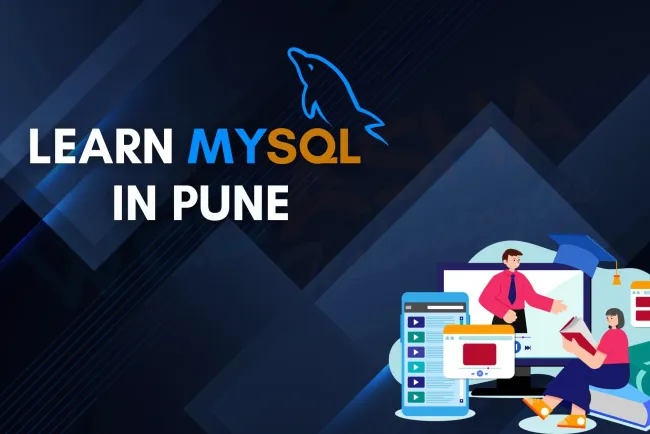Best MySQL Training Course for Beginners and Professionals in Pune | Complete Guide 2025
Explore top-rated MySQL training in Pune. Learn database management, SQL, joins, optimization, and real-time projects with expert guidance. Ideal for students and professionals.

Table of Contents
- Why Learn MySQL in 2025?
- What Is MySQL and Why Is It Important?
- Who Should Enroll in MySQL Training?
- What Topics Are Covered in a MySQL Training Program?
- How Long Does It Take to Learn MySQL?
- Benefits of MySQL Training for Students and Professionals
- How to Choose the Best MySQL Training in Pune
- Tools and Technologies Used Along with MySQL
- Certifications You Can Pursue After MySQL Training
- What’s the Scope of MySQL in 2025?
- Conclusion
- Frequently Asked Questions (FAQs)
Why Learn MySQL in 2025?
MySQL is one of the world’s most widely used open-source relational database management systems (RDBMS). From powering high-traffic websites to managing enterprise-grade applications, MySQL remains a core skill for developers, data analysts, and cybersecurity professionals. In 2025, with data-centric applications dominating the tech space, learning MySQL is a smart career move—especially for students, IT graduates, and professionals looking to enter data roles.
What Is MySQL and Why Is It Important?
MySQL is an RDBMS that uses Structured Query Language (SQL) to manage and manipulate data stored in databases. It's used for:
-
Web application development
-
Data analytics
-
Backend development
-
Cybersecurity monitoring
-
Business intelligence (BI)
MySQL powers many leading platforms including WordPress, Facebook, and Shopify. Its stability, speed, and ease of use make it essential in modern development environments.
Who Should Enroll in MySQL Training?
MySQL training is ideal for:
-
Computer science and IT students
-
Web developers and backend engineers
-
Data analysts and business intelligence professionals
-
Cybersecurity learners
-
Professionals looking to upskill for database roles
Whether you’re a beginner or someone transitioning into tech, structured MySQL training helps you master data management from scratch.
What Topics Are Covered in a MySQL Training Program?
A comprehensive MySQL course typically includes:
✅ Basics of RDBMS
-
Understanding relational databases
-
Primary keys, foreign keys, and relationships
✅ SQL Fundamentals
-
SELECT, INSERT, UPDATE, DELETE commands
-
WHERE, GROUP BY, ORDER BY clauses
✅ Advanced SQL Operations
-
Joins (INNER, LEFT, RIGHT, FULL)
-
Subqueries and nested queries
-
Stored procedures and functions
✅ Database Design and Normalization
-
Entity Relationship Diagrams (ERD)
-
1NF, 2NF, 3NF, and denormalization
✅ MySQL Administration
-
User roles, access privileges, backups
-
Indexing and query optimization
-
Handling large datasets
✅ Real-Time Projects
-
E-commerce data models
-
Student or employee management systems
-
Sales reporting dashboards
How Long Does It Take to Learn MySQL?
For beginners, a structured training program typically spans 4–8 weeks:
-
Week 1–2: Basics and SQL queries
-
Week 3–4: Advanced joins and database design
-
Week 5–6: Real-time projects and optimization
-
Week 7–8: Practice tests, revision, and interview prep
Bootcamps and fast-track training options are also available for quick learners.
Benefits of MySQL Training for Students and Professionals
-
Career Readiness: MySQL skills are in demand across tech, finance, healthcare, and e-commerce.
-
Foundation for Advanced Tools: Understanding MySQL makes it easier to learn PostgreSQL, MongoDB, or cloud-based systems like AWS RDS.
-
Security and Compliance Knowledge: Learn how to secure databases and comply with data governance.
-
Job Roles After Training:
-
Database Developer
-
SQL Analyst
-
Backend Developer
-
Data Engineer
-
Cybersecurity Analyst
-
How to Choose the Best MySQL Training in Pune
When selecting a MySQL course in Pune, look for:
-
Live project experience
-
Instructor-led sessions
-
Certifications
-
Job assistance or placement support
-
Affordable pricing and demo classes
Courses that blend theory with hands-on labs using real datasets offer maximum value.
Tools and Technologies Used Along with MySQL
-
PHP / Python – For backend web integration
-
Excel / Power BI – For data visualization
-
Linux CLI – For server-side database management
-
Docker / Git – For version control and deployment
Training programs often include exposure to these tools.
Certifications You Can Pursue After MySQL Training
While MySQL itself offers Oracle-certified credentials, training also prepares you for:
-
Oracle Certified MySQL Database Administrator
-
Microsoft SQL Associate
-
Data Analyst Certifications (Google, IBM, etc.)
These enhance your resume and job prospects.
What’s the Scope of MySQL in 2025?
With the explosion of data and digital applications, database management skills are more crucial than ever. MySQL continues to evolve with modern features like JSON support, replication, and improved performance. Skilled MySQL professionals are in high demand in:
-
Web development companies
-
Startups and tech firms
-
Healthcare and fintech sectors
-
Government data management initiatives
Conclusion: Is MySQL Training Worth It?
Absolutely. MySQL training is the perfect launchpad for anyone aiming to enter the data, development, or security industries. Its real-world applications, vast job market, and ease of learning make it a top choice for students and professionals alike.
FAQs
What is MySQL and why should I learn it?
MySQL is an open-source relational database system used in countless web, enterprise, and mobile applications. It's essential for managing structured data efficiently.
Who can join a MySQL training program?
Students, working professionals, aspiring data analysts, developers, and IT graduates can join a MySQL training course.
Is MySQL good for beginners?
Yes, MySQL is beginner-friendly and widely considered one of the best database systems to start with due to its simplicity and community support.
What are the prerequisites for learning MySQL?
Basic computer knowledge and familiarity with programming or data concepts can be helpful but are not mandatory.
How long does it take to complete a MySQL training course?
Most MySQL courses range from 4 to 8 weeks, depending on the depth of the curriculum and student pace.
What topics are included in MySQL training?
Key topics include SQL commands, joins, subqueries, database design, optimization, MySQL administration, and real-time projects.
Is coding required for MySQL training?
A basic understanding of programming helps, but SQL is easy to learn even without a deep coding background.
Can I get a job after completing a MySQL course?
Yes, many companies hire database developers, analysts, and administrators with strong MySQL knowledge.
What job roles can I get after MySQL training?
You can become a SQL developer, database analyst, backend developer, business intelligence analyst, or data engineer.
Are there certifications available after MySQL training?
Yes, certifications like Oracle Certified MySQL Developer or other SQL-based credentials can boost your resume.
Can I learn MySQL online?
Yes, many training programs offer online MySQL classes with live sessions, recordings, and project support.
What is the average salary for a MySQL professional?
In India, beginners can earn ₹3–5 LPA, while experienced professionals can make ₹10 LPA or more, depending on their role.
Is MySQL used in real-world applications?
Yes, MySQL is used by major companies like Facebook, WordPress, and Uber for handling large-scale data operations.
What is the difference between SQL and MySQL?
SQL is a language used to interact with databases, while MySQL is a database management system that uses SQL.
Do I need to learn other languages with MySQL?
Learning PHP, Python, or JavaScript alongside MySQL can help in full-stack development or data analysis roles.
How is MySQL used in cybersecurity?
In cybersecurity, MySQL is used to store logs, audit trails, and user activity data for threat detection and analysis.
Does MySQL training include real-time projects?
Yes, most structured training programs include projects like inventory systems, employee databases, and e-commerce models.
Can MySQL training be done during college?
Absolutely. Many college students opt for part-time or weekend batches to build skills alongside their academic studies.
Is MySQL still relevant in 2025?
Yes, MySQL remains one of the top database systems globally due to its speed, scalability, and community support.
What are the common tools used with MySQL?
Popular tools include phpMyAdmin, MySQL Workbench, DBeaver, and command-line interfaces on Linux or Windows.
How do I practice MySQL?
You can install MySQL locally or use platforms like db-fiddle, XAMPP, or cloud-based MySQL servers for practice.
What is MySQL Workbench used for?
MySQL Workbench is a visual tool for database design, modeling, SQL development, and performance optimization.
Can I learn MySQL without a computer science degree?
Yes, anyone with logical thinking and interest in data can learn and master MySQL through guided training.
What is the cost of a MySQL training course in Pune?
Costs may range from ₹5,000 to ₹15,000 depending on course depth, duration, and value-added services like job support.
Does MySQL training offer job assistance?
Many institutes offer placement help, mock interviews, and resume preparation to support job-seeking students.
Is MySQL required for data science?
Yes, SQL and MySQL are foundational tools in data science for handling structured data and preparing datasets.
What kind of companies hire MySQL professionals?
Tech startups, IT companies, banks, e-commerce platforms, and government data agencies all hire MySQL experts.
What’s the difference between MySQL and PostgreSQL?
PostgreSQL offers advanced features and stricter compliance, while MySQL is known for speed and ease of use.
Does MySQL support big data handling?
While MySQL is not a big data tool, it can handle large datasets efficiently when optimized with indexing and partitioning.
How often should I update my MySQL skills?
With regular updates and new SQL features, it’s best to revisit your training or certifications every 2–3 years.5












![Top 10 Ethical Hackers in the World [2025]](https://www.webasha.com/blog/uploads/images/202408/image_100x75_66c2f983c207b.webp)










